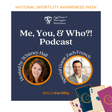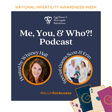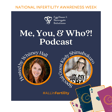
S3 NIAW E3 Who?! From Misconceptions to Empowerment with Dr. Dara Havemann
Summary
In this conversation, Whitney and Dr. Dara Havemann delve into the complex world of infertility. They address common misconceptions and explore the deep emotional impacts that infertility can have on individuals and families. Dr. Havemann emphasizes the importance of open communication, both among those experiencing infertility and within their support networks. She also discusses the various avenues available for family building—such as egg donation and surrogacy—and offers practical advice on navigating these paths. Highlighted during National Infertility Awareness Week, this episode provides listeners with a compassionate, informed perspective on overcoming infertility challenges and finding hope on the journey to building a family.
Takeaways
-Infertility affects 1 in 6 people today.
-Many believe they haven't tried long enough before seeking help.
-Stress is often blamed for infertility, but it's not the sole factor.
-Communication is crucial in surrogacy and egg donation.
-Infertility is becoming a more common topic of discussion.
-Support from friends and family can vary greatly in need.
-Exploring third-party reproduction can be a valid path to parenthood.
-Egg donation does not deplete a woman's fertility.
-National Infertility Awareness Week aims to shed light on these issues.
Links



















